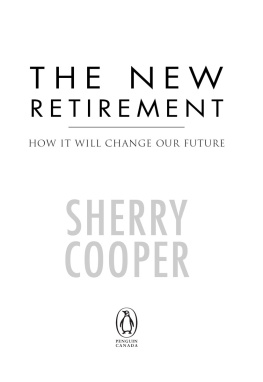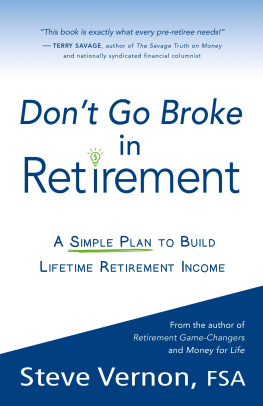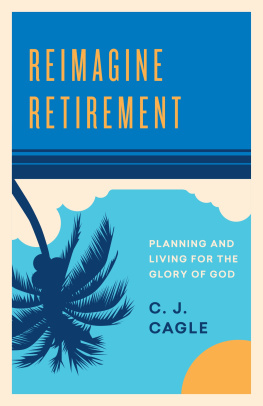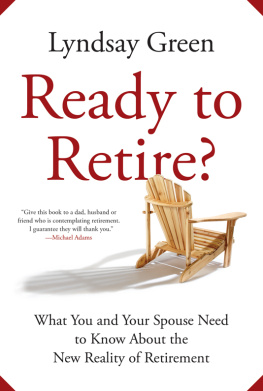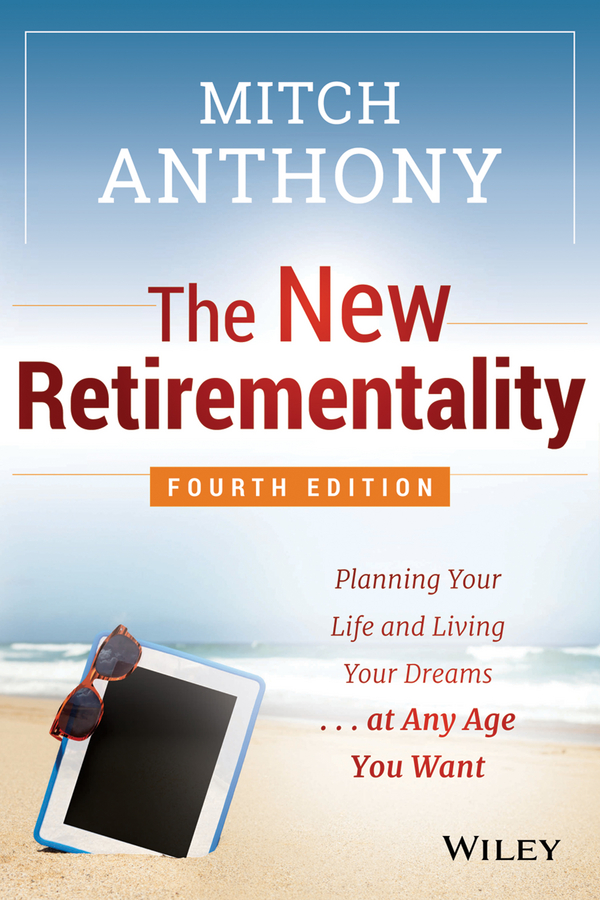Contents

Cover image: Summer Reading iStockphoto/YinYang
Cover design: Wiley
Copyright 2014 by Mitch Anthony. All rights reserved.
Published by John Wiley & Sons, Inc., Hoboken, New Jersey.
The first and second editions of the book were published by Kaplan Publishing. The third edition of the book was published by John Wiley & Sons, Inc.
Published simultaneously in Canada.
No part of this publication may be reproduced, stored in a retrieval system, or transmitted in any form or by any means, electronic, mechanical, photocopying, recording, scanning, or otherwise, except as permitted under Section 107 or 108 of the 1976 United States Copyright Act, without either the prior written permission of the Publisher, or authorization through payment of the appropriate per-copy fee to the Copyright Clearance Center, Inc., 222 Rosewood Drive, Danvers, MA 01923, (978) 750-8400, fax (978) 646-8600, or on the Web at www.copyright.com . Requests to the Publisher for permission should be addressed to the Permissions Department, John Wiley & Sons, Inc., 111 River Street, Hoboken, NJ 07030, (201) 748-6011, fax (201) 748-6008, or online at http://www.wiley.com/go/permissions .
Limit of Liability/Disclaimer of Warranty: While the publisher and author have used their best efforts in preparing this book, they make no representations or warranties with respect to the accuracy or completeness of the contents of this book and specifically disclaim any implied warranties of merchantability or fitness for a particular purpose. No warranty may be created or extended by sales representatives or written sales materials. The advice and strategies contained herein may not be suitable for your situation. You should consult with a professional where appropriate. Neither the publisher nor author shall be liable for any loss of profit or any other commercial damages, including but not limited to special, incidental, consequential, or other damages.
For general information on our other products and services or for technical support, please contact our Customer Care Department within the United States at (800) 762-2974, outside the United States at (317) 572-3993 or fax (317) 572-4002.
Wiley publishes in a variety of print and electronic formats and by print-on-demand. Some material included with standard print versions of this book may not be included in e-books or in print-on-demand. If this book refers to media such as a CD or DVD that is not included in the version you purchased, you may download this material at http://booksupport.wiley.com . For more information about Wiley products, visit www.wiley.com .
Library of Congress Cataloging-in-Publication Data:
ISBN 9781118705124 (Hardcover)
ISBN 9781118705100 (ePDF)
ISBN 9781118705025 (ePub)
This book is dedicated to my mother, Bettie Anthony Huntley, who has never been afraid to blaze her own trails and follow her dreams. A generous portion of her spirit guides my life as well.
Preface
The world continues to awaken to the realities of this strange institution we have created called retirement . Ideas that sounded novel when I first wrote them down 12 years ago now appear to be fairly common sentiment. My inspiration for this fourth edition has come from both the 60-plus rebels who have decided to live life on their own terms, as well as insights from those much younger.
For example, Ryan (age six) is quite possibly a writer in waiting. He is the son of my wifes horse trainer. Ryan has visited with me in my library, where we discuss life, writing, and other macro themes that prevail upon the mind of precocious kindergartners. Recently, his mother sent this note to me:
One day I was explaining what retirement meant to my son Ryan. He looked at me in a very puzzled way after digesting the meaning of this strange concept and then said to me, Mommy, when I get older I will never retire because I am going to love my job. After pondering the concept for a minute longer he continued, And you will never retire either will you Mommy? Because you love your job too; right? I just laughed and reassured him that No, I will probably never retire either because I truly do love my job. I smiled and thought how lucky he was at the young age of six to already have so much figured out. If only we could have more people entering our workforce with the focus not on that magical date of retirement, but rather on enjoying their journey through life and making the most of each day. Bless our sweet children for reminding us what is important in life....
As I was finishing writing this revision, I received a note from Marta, a woman in her 20s who had read an earlier edition, asking me if it had been published in Polish. I told her, regrettably, that it had not yet been published in Polish. I am half Polish, so I naturally felt an affinity toward Marta and inquired as to her reason for asking. Heres what she had to say:
My parents are 55 and 54. Dad is in Afghanistan and mom moved back to Poland last year. Dad is ending his seventh tour this December and is going to retirewith momin Poland. I would like them to read your book because Im afraid they are going to end up in a nut house with four padded white walls! Thirty years is a long time to do NOTHING. If they do not want to actually WORK FOR THE MAN, I want them to do SOMETHING. I just do not know the way to approach.
Neither Ryan nor Marta needed anyone to explain the rationale for wanting to fully retire to them. They instinctively understood, in viewing the idea through the lens of the soul, that retirementas it has been fashioned and formed over the last 100 yearscomes woefully short of helping human beings optimize their time on this planet.
Money is a part of the retirement discussion but is not the primary component, despite the modern cultural inferences of the term retirement planning. What needs to be planned for is much bigger than the accumulation and distribution of your means. Dont get me wrong: having the means to retire is important. But what we also must plan forbut often dontis meaning. Age is irrelevant when we discuss meaning at the individual level. Read and explore this book with an open mind and an even wider heart and I am confident that you, too, will cross the bridge toward the most meaningful stage of life yet.
Acknowledgments
This book has an audience primarily because of the belief and encouragement provided by literary agent and publishing consultant Cynthia Zigmund.
Whatever degree of refinement the reader finds in this text is due to the ever watchful and always caring eye of my wife and first-line editor, Debbie.
For her incisive eye and diligent archeology, I wish to thank my researcher, Nadia Marquez, for a job well done.
I wish to acknowledge the many authors quoted in this book whose ideas may have seemed to find the bleeding edge instead of cutting edge because they were ahead of their time. Their ideas about retirement life and changes are the seeds that have the power to ultimately enrich many frustrated souls.
M.A.
Chapter 1
A Short History of Retirement
When I want to understand what is happening today, I try to decide what will happen tomorrow; I look back; a page of history is worth a volume of logic.
Oliver Wendell Holmes
The U.S. standard-gauge railroad track is four feet, eight and one-half inches wide. Why such an odd measure? Because that was the width in England and the United States when railroads were built by British expatriates.


